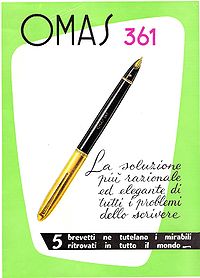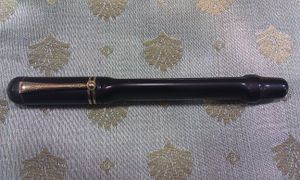Differenze tra le versioni di "Omas/en"
(Creata pagina con 'After the war production resumed with new ogival pens and the transition to piston filler. In 1946 the Extra line was completely restyled, the wheel clip wa...') |
(Creata pagina con 'left|thumb|200px|Advertising for an [[Omas 361|361 ]]') |
||
| Riga 40: | Riga 40: | ||
After the war production resumed with new ogival pens and the transition to [[piston filler]]. In 1946 the [[Omas Extra|Extra]] line was completely restyled, the wheel clip was maintained but were used three rings on the cap. Also the [[piston filler]] was adopted and a transparent section for viewing ink level was introduced. Three sizes were maintained: small, medium and large, identified respectively with the numbers [[Omas 55x|555]], [[Omas 55x|556]] and [[Omas 55x|557]]. | After the war production resumed with new ogival pens and the transition to [[piston filler]]. In 1946 the [[Omas Extra|Extra]] line was completely restyled, the wheel clip was maintained but were used three rings on the cap. Also the [[piston filler]] was adopted and a transparent section for viewing ink level was introduced. Three sizes were maintained: small, medium and large, identified respectively with the numbers [[Omas 55x|555]], [[Omas 55x|556]] and [[Omas 55x|557]]. | ||
| − | [[Image:1959-Omas-361.jpg|left|thumb|200px| | + | [[Image:1959-Omas-361.jpg|left|thumb|200px|Advertising for an [[Omas 361|361]] ]] |
Nel 1948 venne realizzata quella che è forse la più significativa invenzione nel mondo della stilografica italiana, il modello [[Omas 361|361]]. Nata in risposta al successo della [[Parker 51]], l'originalità della penna sta nella posizione centrale del pennino, montato sull'asse della penna, intorno al quale è posto un controcappuccio aperto su un lato. A seconda della posizione di di uso della penna, ed in particolare del lato aperto, il pennino può essere quasi completamente coperto, ottenendo una scrittura rigida, o lasciato scoperto, consentendo una scrittura flessibile. Un sistema di gradazione del tratto molto funzionale, tanto che si narra che la stessa [[Parker]] tentò più volte di acquisire il brevetto ({{Cite patent|US|2565667}}) dalla [[OMAS]]. | Nel 1948 venne realizzata quella che è forse la più significativa invenzione nel mondo della stilografica italiana, il modello [[Omas 361|361]]. Nata in risposta al successo della [[Parker 51]], l'originalità della penna sta nella posizione centrale del pennino, montato sull'asse della penna, intorno al quale è posto un controcappuccio aperto su un lato. A seconda della posizione di di uso della penna, ed in particolare del lato aperto, il pennino può essere quasi completamente coperto, ottenendo una scrittura rigida, o lasciato scoperto, consentendo una scrittura flessibile. Un sistema di gradazione del tratto molto funzionale, tanto che si narra che la stessa [[Parker]] tentò più volte di acquisire il brevetto ({{Cite patent|US|2565667}}) dalla [[OMAS]]. | ||
Versione delle 01:13, 13 gen 2013
OMAS was founded in 1925 and is one of the historic Italian fountain brands. Since then, albeit with mixed success, and with several changes of ownership occurred after the death of its founder, it has always remained active in the fountain pen market. Ownership passed in 2000 to the French Luis Vuitton company, that sold it in October 2007 to the Chinese Xinyu Hengdeli company.
In its activities OMAS has been characterized by a remarkable capacity for technical innovation and product quality, resulting probably from these point of view better than any other Italian company. It cannot be said, however, that it has particularly excelled for innovation in design, because all its most famous models, also if they often are better quality than the originals, always show in a clear manner a high rate of imitation of the stylistic features of other brands models. Despite this, the quality of the OMAS production, the ability to create imitations that are better than the originals, and in particular the refinement of its celluloid models makes this brand one of the most sought after by collectors.
| Omas |
|---|
| Brand pages |
| Brand advertising |
| Brand photos |
| Instructions sheet |
| Other documents |
| Patents |
History

OMAS was founded in 1925 in Bologna by Armando Simoni, but it was from 1919 that Simoni, just married, had opened a workshop in Via S. Vitale where he produced film reels and mechanisms for safety pens.[1] Briefly the workshop began to produce pieces and parts for fountain pens of the leading companies. Having obtained considerable success, customer demand grew, and Simoni started expanding the company and also began to produce whole pens. These early years models are hard rubber lever filler or safety pens, made as a clear imitation of the Waterman models.
But it was only in 1925, after having completed the construction of its own factory in Via degli Orbi, that Officine Meccaniche Armando Simoni were create, whose acronym, OMAS, will become the brand used for the marketed fountain pens. The first relevant model produced by OMAS was the "penna del dottore", patented in 1927, was an hard rubber lever filler model with a compartment located inside the barrel of the pen that contained in addition to the sac and the lever mechanism, a thermometer for measuring the fever, kept separate from the rest by a metal partition. The same year Simoni patented the metal joint used for the construction of the OMAS desk pens, for which the company becomes one of the leading Italian manufacturers.
The initial OMAS production of is characterized by various Flat top button filler models, clear imitations of the Duofold. However some of these models were characterized by original technical solutions, as for the second version of the "penna del dottore" in which again the thermometer was hosted by the body of the pen, or as for the "penna del calligrafo", which was equipped with a special section that could be easily unscrewed, allowing an easy the change of the nib type, which was directed towards the use by calligraphers.
In this same time period there is a presence in Italy of some Parker models (Duofold and Thrift Time) marked "Geo. S. Parker - made in Italy" whose production is attributed to OMAS. There is a debate about these pens, whether if this can be considered a real production commissioned by the Parker, to circumvent the restrictions imposed by the autarkic policies of the fascist regime, or if it is a semi-official production commissioned by the Parker agent for Italy, Edoardo Russo Webber, who was facing a supply shortage, or if it is indeed a clandestine (and illegal) production. As there are no documents, nor other findings than those of later interactions from Webber and Simoni for the production of the Saratoga pens, it's impossible to come to any definite conclusion.
OMAS between the first Italian companies to switch to celluloid in the late '20s or early '30s, producing its fountain pens as well as in the classic colors like green jade or lapis lazuli and also interesting variation of marbled colors. Between the production of this time there are some celluloid pens, with cap and clip similar to that used in the previous Duofold imitations, but having instead tapered ends. These were probably born in the early '30s, following the establishment of the streamlined style, and only a couple of samples are known. More or less in this period can be traced back the production beginning of the Minerva branded pens, the only real OMAS sub-brand,[2] dedicated to the production of second-tier but not less than excellent quality.
The real turning point in the OMAS production happened in 1932, when it introduced what is was for several decades one of the top models of the company, the Omas Extra, made of faceted celluloid, a lever filler model with a very large cap band, decorated with a greek pattern. The pen was produced in four different sizes and launched with the slogan the creation of an artist and a scientist, and it was accompanied by a very extensive advertising campaign.
Although the Omas Extra is very similar to Doric, introduced a few months earlier, the question whether it is an imitation is still controversial, since the elapsed time is rather short. The OMAS fans argue that, given the short time between the release of the two pens, it would not have been possible to create production facilities if the Omas Extra had been a Doric imitation, but there is no information to support this statement while there are ample confirmation for the OMAS tendency to imitate American models. Regardless of whether it can be considered an imitation or not the Omas Extra for its quality of materials and workmanship, can be considered of equivalent, if not higher, quality than the model to which it may be have inspired. The pen also had a huge success and remained in production until 1946, albeit with minor stylistic changes, such as creating a smooth version and the transition to a decorative three-ring instead of the greek band.
In 1936 a new model, the Lucens, was patented and introduced using with an original, at least for Italy, filling system, called "stantuffo tuffante". In fact, the mechanism is almost the same of the one used by Dunn 15 years before; although it is not possible to determine whether it is a copy or an independent realization. Nevertheless the Lucens constitutes one of the most beautiful fountain pens ever realized, in particular for the beauty of celluloids, equipped with transparent sections for viewing ink.
Made initially onlu in the in smooth round version, the Lucens was joined immediately by Extra Lucens, havingfaceted body like the Extra, but still using the "stantuffo tuffante" filling system. In 1938 the wheel clip (very similar to the Doric one) was replaced by an arrow shaped clip, a clear imitation of the one introduced by the Parker with the Vacumatic. The imitation even more evident by the presence of a arrow engraving of the nib, almost identical to the Vacumatic one. Also the greek band cap decoration was replaced by three thin rings. Despite the imitations Extra Lucens is a pen without a doubt superior in all aspects (technical, aesthetic and manufacturing quality) to any Vacumatic and probably is the best model ever produced by OMAS.
With the progress of the war raw materials began to be scarce and in particular gold for nibs, as the majority of European companies OMAS had to resort to some steel alloy, that the company renamed Permanio, that was declared to be better even than gold. In fact just this alloy proved to be one of the most susceptible to corrosion, so that today Permanio nibs are rare and have a much higher value of their analogues in gold.
After the war production resumed with new ogival pens and the transition to piston filler. In 1946 the Extra line was completely restyled, the wheel clip was maintained but were used three rings on the cap. Also the piston filler was adopted and a transparent section for viewing ink level was introduced. Three sizes were maintained: small, medium and large, identified respectively with the numbers 555, 556 and 557.

Nel 1948 venne realizzata quella che è forse la più significativa invenzione nel mondo della stilografica italiana, il modello 361. Nata in risposta al successo della Parker 51, l'originalità della penna sta nella posizione centrale del pennino, montato sull'asse della penna, intorno al quale è posto un controcappuccio aperto su un lato. A seconda della posizione di di uso della penna, ed in particolare del lato aperto, il pennino può essere quasi completamente coperto, ottenendo una scrittura rigida, o lasciato scoperto, consentendo una scrittura flessibile. Un sistema di gradazione del tratto molto funzionale, tanto che si narra che la stessa Parker tentò più volte di acquisire il brevetto (nº US-2565667) dalla OMAS.
L'introduzione della 361 portò ad una serie di novità anche sul piano stilistico oltre che su quello tecnico, per la sua produzione vennero infatti adottate delle nuove linee di forma ogivale, inoltre si passò ad una singola veretta sul cappuccio ed al meccanismo di caricamento a stantuffo che venne utilizzato per tutta la produzione eccettuata la Extra Lucens che rimase con lo stantuffo tuffante, la clip a freccia ed i tre anellini sul cappuccio, restando in produzione, sia pure senza pennino bicolore, nel solo colore nero e nelle dimensioni grande e media per tutti gli anni '50.
Sono inoltre da segnalare, introdotti all'incirca nel 1950 e mantenuti in produzione per brevissimo tempo, i modelli 351 e 352, penne rarissime ed introvabili, di forma faccettata, ma con caricamento a stantuffo, il cui corpo era realizzato incollando alternativamente sezioni di celluloide trasparente e colorata, così da ottenere uno straordinario risultato di serbatoio trasparente a sezioni alternate.
Nello stesso periodo le forme ogivali della 361 vennero adottate anche per gli altri modelli: venne realizzata la Lucens Ogiva e nuove versioni ogivali della vecchia Extra (denominate 555/S, 556/S e 557/S) costruite in celluloide con finestra trasparente rossa o gialla, e presenti anche nelle varianti con cappuccio metallico. Le forme sfaccettate vennero comunque mantenute, sia per la 361 che per la nuova serie delle Extra con i modelli denominati 555/F, 556/F e 557/F.
Negli anni successivi la produzione della OMAS proseguì, con la realizzazione di penne stilografiche in celluloide con caricamento a stantuffo. L'azienda produsse nuovi modelli coma la VS e la CS. Con la morte di Armando Simoni nel 1958 però non vennero prodotte significative innovazioni, anche se negli ultimi decenni sono stati introdotti diversi modelli, cercando di inseguire la fascia alta del mercato e degli oggetti di lusso, riportando anche in produzione alcuni modelli in celluloide simili a quelli degli anni '30. L'azienda è ancora oggi presente sul mercato, pur essendo passata di mano dagli eredi di Simoni per essere prima ceduta prima alla Luis Vuitton e poi alla cinese Xinyu Hengdeli.
Template:CronoMarche |- | 1925 || Nascita della OMAS |- | 1927 || Viene brevettata la Penna del dottore |- | 1932 || Introdotto il modello Extra |- | 1934 || Introdotto il modello Minerva Classica |- | 1936 || Introdotti i modelli Lucens ed Extra Lucens con caricamento a stantuffo tuffante |- | 1936 || Sostituita la vera con tre anelli sul cappuccio sulla Extra tonda |- | 1938 || Introdotta la clip a freccia sul modello Extra Lucens |- | 1940 || Introdotti i pennini in Permanio |- | 1940 || Sostituita la vera con tre anelli sul cappuccio sulla Extra faccettata |- | 1946 || Ristilizzato il modello Extra, sostituito dalla nuova versione a stantuffo |- | 1948 || Introdotto il modello 361, ristilizzati i modelli Extra |- | 1950 || Introdotti i modelli 351 e 352 |- |}
Template:LegendaModelli |- | Extra || 1932 || XX, ? |- | Lucens || 1936 || XX, ? |- | 361 || 1948 || XX, ? |- |}
Note
- ↑ in 1922 there is a registration for the Officine Meccaniche di Precisione Simoni Armando.
- ↑ there are many pens that are known as made by OMAS on behalf of other companies, often directly derived from Minerva models; between them there are productions for the Ercolessi, the Saratoga or Scotland brands, and perhaps also the Nettuno Superba, there are also attributions to OMAS for the production of some particular models, as the Itala and, almost certainly wrong, the Zerollo, but the only pens marketed directly by the company and appearing in its catalogs are the Minerva ones.
Riferimenti esterni
- http://www.omas.net/ Sito ufficiale dell'azienda, irrilevante per le informazioni storiche
- http://www.rickconner.net/penoply/misc.19.html Articolo con qualche informazione storica
- http://www.rickconner.net/penspotters/omas.html Articolo con qualche informazione storica
- http://www.pennamagazine.com/load_detail.aspx?id=5&nt=stilo Interessante articolo sui modelli tipo Duofold
- http://www.pennamagazine.com/load_detail.aspx?id=4&nt=stilo Altro articolo sui modelli tipo Duofold

